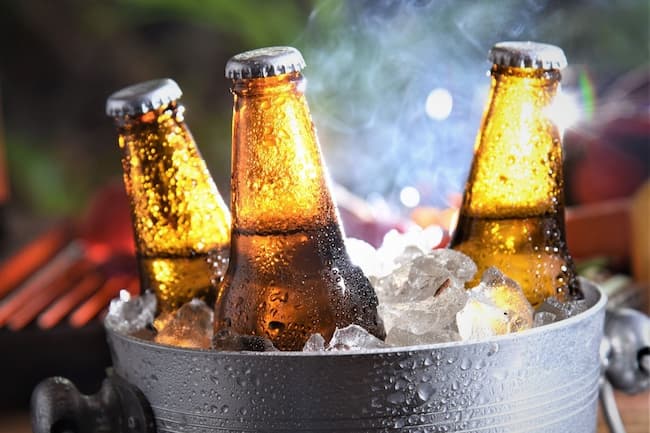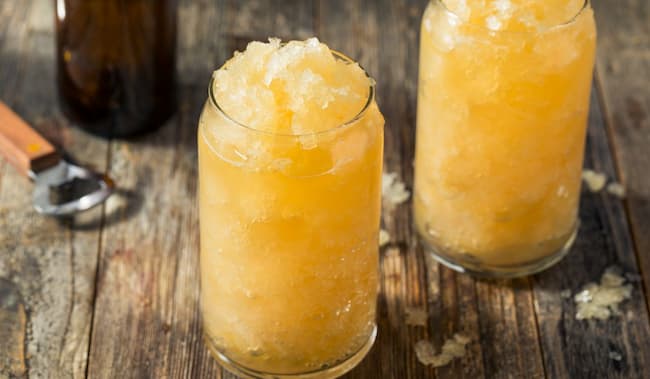Have you ever wondered does beer freeze or not? It’s a common question among beer drinkers, and the answer is yes — but with some caveats. Beer does indeed freeze, although it takes longer to reach freezing temperatures than water does. The reason for this has to do with the alcohol content of the brew.

This difference in ABV affects how quickly each liquid will reach its frozen state. In addition, certain types of beers are more likely to freeze than others due to their higher sugar and alcohol content. So let’s take a look at does beer freeze, what happens when beer freezes, and why it takes longer than water!
Does Beer Freeze?
Beer can indeed freeze, but due to its higher alcohol content, it takes longer to reach its frozen state than water. When beer does freeze, the water in it forms ice crystals, while the alcohol remains in liquid form.
This is why if you leave a bottle of beer in the freezer too long, you will end up with a slushy mess instead of a solid block of ice. This is because the alcohol in beer prevents it from freezing as quickly as water does, and even when it does freeze, some of it remains liquid.

The freezing point of beer also depends on its alcohol content. The higher the ABV, the longer it will take for the beer to freeze. This means that beers with higher alcohol content, such as imperial stouts or barley wines, are less likely to freeze than lagers or pilsners.
In addition, certain types of beers, such as wheat beers and Belgian ales, contain more sugar than others, which can affect their freezing point. It’s important to note that the freezing point of beer is much lower than the freezing point of water.
This means that beer can freeze at temperatures as low as -13°F, while water freezes at 32°F. Therefore, it’s important to make sure your beer stays well below this temperature if you don’t want it to freeze.
You might also like: How to open beer with lighter
Does Beer Freeze Faster Than Water?
The freezing point of water is 32°F, while the freezing point of beer is much lower—as low as 28°F. This means that if you put a bottle of beer in the freezer, it will take much longer to reach its frozen state than a bottle of water.
This is because the alcohol content in beer prevents it from freezing as quickly. In addition, beers with a higher alcohol content will take even longer to freeze than those with a lower ABV.
A strong beer can have even lower freezing points. For example, some beers with high alcohol content can freeze at temperatures as low as -20°F. In these cases, the beer will still take much longer to reach its frozen state than water.
The takeaway here is that beer does freeze, but it takes significantly longer to reach its frozen state than water. This is due to the alcohol content in beer, which prevents it from freezing as quickly.
Beers with a higher alcohol content will take even longer to freeze than those with lower alcohol content, so it’s important to be careful and keep an eye on the temperature of your beer if you don’t want it to freeze.
How Long Does It Take For Beer To Freeze?
Does beer freeze? Yes. But how long does it take?
Generally speaking, it takes around 3-4 hours for a regular bottle of beer to freeze at 0°F. However, this can vary based on the ABV of the beer, as well as environmental factors such as humidity and temperature. For instance, in a colder environment, it may take significantly less time for beer to freeze.
In addition, beers with higher alcohol content will take longer than those with lower ABV. For example, a bottle of imperial stout or barleywine could take up to 5-6 hours to freeze at 0°F. On the other hand, a light lager or pilsner could take as little as 2-3 hours to reach its frozen state.
Ultimately, the amount of time it takes for a beer to freeze is highly dependent on its ABV as well as the environment it’s in. Beers with a higher ABV will take even longer to freeze than those with a lower ABV.
Conclusion
So, does beer freeze? In conclusion, yes, beer does freeze—but it takes longer than water due to its higher alcohol content. It’s important to keep an eye on the temperature of your beer to ensure it doesn’t freeze, and never leave a bottle of beer in the freezer for too long. Hope this helps. Visit Chill Beer for more useful and interesting guides.